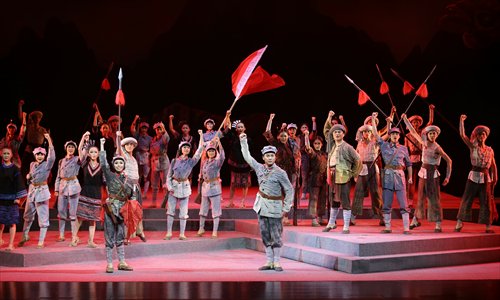HOME >> CHINA
PLA art troupes shrink under military restructuring
By Ding Xuezhen Source:Global Times Published: 2016-1-25 20:18:01

Dancers perform the Red Detachment of Women, one of the most popular Chinese ballets in a theater in South China's Hainan Province on Wednesday. Photo: CFP
The art troupe of the Nanjing Military Area has been shut down amid the ongoing massive restructuring of the People's Liberation Army (PLA), recent reports said.
The Beijing News reported Wednesday that the art troupe under the Nanjing Military Area Command had been shut down, after a PLA Daily report referred the troupe's performers as being "formerly" of the Nanjing Military Area.
During September's military parade in Beijing, President Xi Jinping announced that 300,000 soldiers would be demobilized as part of far-reaching reforms.
After a defense ministry spokesperson announced that the demobilized soldiers would mostly be noncombat personnel or come from units with "outdated equipment," many argued that the PLA art troupes fit these criteria and should be streamlined.
Loss of purpose
"The restructuring of the PLA art troupes will mostly consist of changes to their structure and size; their tasks and functions will not change," said Cai Xiaoxin, an expert on military history and son of Major General Cai Changyuan - one of the country's founding fathers.
The opera and modern drama troupes under the PLA General Political Department are now under the Political Work Department of the Central Military Commission, according to recent PLA Daily reports.
"I think the art troupes of the military will not completely disappear," Major General Xu Guangyu, a senior consultant of the China Arms Control and Disarmament Association, told the Global Times.
A streamlined group of high-level art workers will be conserved, Xu said.
Art troupes used to play an important role in boosting soldiers' morale and promoting unity, according to Xu. But today, with diversified means for public relations and entertainment within the military, art troupes are losing their glamour, he said.
In addition to becoming less useful they, like many other parts of the military, have been investigated for discipline violations in recent years. Some members of art troupes have been detained on charges of corruption under the ongoing anti-graft campaign, China Newsweek magazine reported in September 2015.
Around 2,000 personnel work in PLA art troupes, according to Tang Dong, former director of the Artistic Creation Department of the Song and Dance Ensemble under the Guangzhou Military Area Command.
"We don't need to worry about the future of troupe members who leave the military in this round of reform," Xu claimed. Troupe members will have a higher degree of freedom and a bigger stage on which they can realize their potential after leaving the military and returning to society, according to the Major General.
He said streamlining the art troupes is necessary as they have become a waste of military resources.
Song Zhongping, a Beijing-based military expert, argued that reforming the art troupes will help improve the army's ability to fight.
"It will close a channel of privilege, through which many are recruited into senior military positions," Song told the Global Times on Thursday, noting that the morale of grassroots officers and soldiers will be likely improved.
"The over-commercialization of the PLA art troupes in the past years greatly influenced the fighting capacity of the military," Song added, noting that the people that the military really needs are those that "can fight the battle and win the war."
New song and dance
The military's cultural and artistic needs can be fulfilled in two ways after the restructuring of the art troupes, according to Song.
On one hand, the military could purchase services from the market when needed; on the other hand, the officers and soldiers could be satisfied in a self-organizing fashion based on their own interests and talents, Song said.
"The role of soldiers in the military's cultural and art work should be shifted from passive receptors to active participators, which will turn the current one-way cultural and art system into a more interactive one."
However, Cai said that it is impractical for the military to buy services taking into account the military's requirements for art workers, such as confidentiality, discipline and the spirit of self-sacrifice needed to perform in remote areas.
"One of the PLA's good traditions in terms of cultural and art work is that the art troupes will go to the frontier to perform for the front-line soldiers," Cai said.
Newspaper headline: The show’s over
Posted in: Society